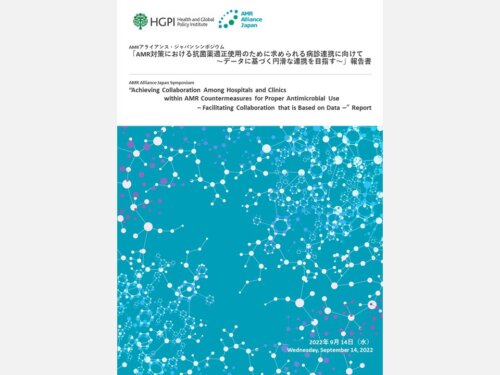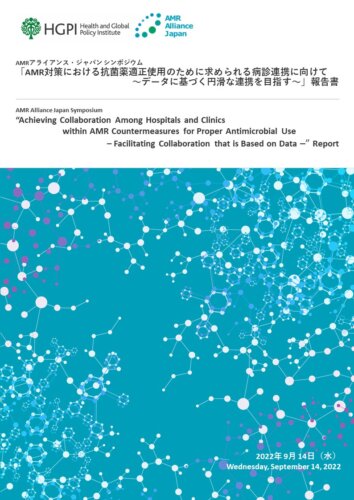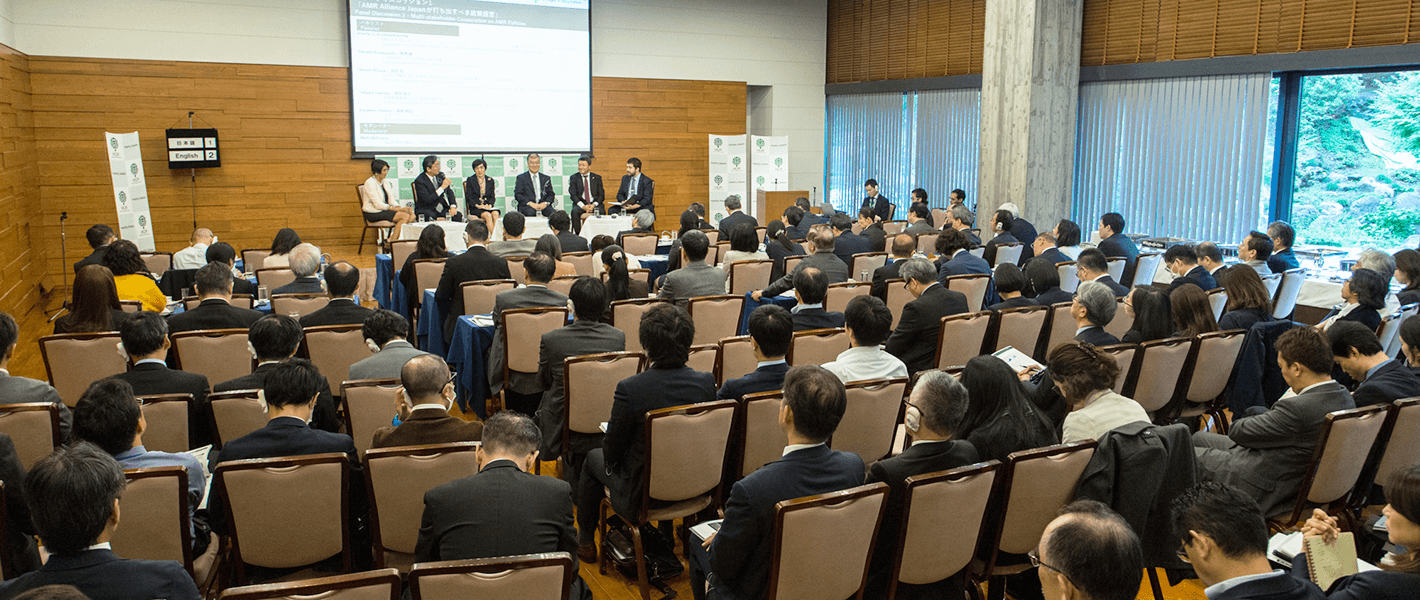[Event Report] AMR Alliance Japan Symposium “Achieving Collaboration Among Hospitals and Clinics within AMR Countermeasures for Antimicrobial Stewardship -Facilitating collaboration that is based on data-” (September 14, 2022)
- Home >
- Information >
- Event >
- [Event Report] AMR Alliance Japan Symposium "Achieving Collaboration Among Hospitals and Clinics within AMR Countermeasures for Antimicrobial Stewardship -Facilitating collaboration that is based on data-" (September 14, 2022)
*A report on the Symposium has been published on August 31, 2023.
 On September 14, 2022, AMR Alliance Japan (Secretariat: Health and Global Policy Institute) hosted a public symposium titled, “Achieving Collaboration Among Hospitals and Clinics within AMR Countermeasures for Antimicrobial Stewardship -Facilitating collaboration that is based on data-.”
On September 14, 2022, AMR Alliance Japan (Secretariat: Health and Global Policy Institute) hosted a public symposium titled, “Achieving Collaboration Among Hospitals and Clinics within AMR Countermeasures for Antimicrobial Stewardship -Facilitating collaboration that is based on data-.”
It is estimated that infections caused by antimicrobial-resistant bacteria result in approximately 1.2 million global deaths annually. In Japan, bacteremia caused by methicillin-resistant Staphylococcus aureus (MRSA) and fluoroquinolone-resistant Escherichia coli take the lives of approximately 8,000 people every year, meaning measures to combat antimicrobial resistance (AMR) must be taken immediately. One key action for effectively countering AMR is maintaining appropriate antimicrobial use to prevent AMR bacteria from increasing. To help achieve this, the National Action Plan on Antimicrobial Resistance 2016-2020 (NAP 2016-2020) enacted by the Government of Japan in 2016 includes the objective of “promoting appropriate use of antimicrobials in healthcare institutions.” In pursuit of that objective, the Ministry of Health, Labour and Welfare (MHLW) has worked to encourage antimicrobial stewardship by formulating and revising the “Manual of Antimicrobial Stewardship” and adding the “Premium for the proper use of antimicrobials” to the medical service fee schedule. Thanks to these initiatives and diligent efforts from relevant parties, antimicrobial consumption has been steadily decreasing. However, the target to “reduce daily antimicrobial use per thousand population to two-thirds of 2013 levels by 2020” set by the NAP 2016-2020 has not been met, and expectations are high for intensified efforts. Promoting appropriate use of broad-spectrum antimicrobials in clinics is also an issue in Japan. To encourage coordination among hospitals and clinics and to promote AMR countermeasures in clinics, the name of the “Premium for infection prevention countermeasures” was changed to “Premium for enhancing infection control measures,” and its requirements were altered in the 2022 revision of the medical fee reimbursement schedule. To accelerate progress, clinics and health insurance pharmacies in communities are rapidly building new systems for collaboration, but some find system development and the updated premium requirements to be confusing.
At the same time, having an accurate grasp of current circumstances is crucial for assessing antimicrobial stewardship. The NAP 2016-2020 also includes an objective for the development of surveillance systems for identifying trends, which led to the creation of surveillance systems which monitor infectious diseases outbreaks and the current status of infection control measures, namely, the Japan Surveillance for Infection Prevention and Healthcare Epidemiology (JSIP) system and the Japan Nosocomial Infections Surveillance (JANIS) system. Data on domestic antimicrobial use is also gathered based on “Surveillance of antibiotic sales in Japan” and on portions of insurance claims in the National Database of Health Insurance Claims and Specific Health Checkups of Japan (NDB). Data gathered systematically from sources like computers used to process insurance claims at health insurance pharmacies has started to accumulate in recent years, which means it is becoming possible to accurately grasp volumes of antimicrobials used in Japan and to monitor for appropriate antimicrobial use in real time and by department.
Based on trends in Japan to encourage proper antimicrobial use and to track the volumes of antimicrobials used, AMR Alliance Japan hosted a public symposium on promoting appropriate antimicrobial use based on surveillance data. There, we held multi-stakeholder discussions on effectively using surveillance data that is gathered to encourage proper antimicrobial use, necessary initiatives from outpatient healthcare facilities and clinics, and the roles of major hospitals in the future.
[Overview]
- Date & time: Wednesday, September 14, 2022; 18:30-20:00 JST
- Format: Online (Zoom meeting)
- Languages: Japanese and English (simultaneous interpretation will be provided)
- Participation Fee: Free
- Host: AMR Alliance Japan (Secretariat: Health and Global Policy Institute)
[Program] (In no particular order; titles omitted. Please note that positions listed are current as of the day of the meeting.)
18:30-18:35 Opening remarks
- Hiroaki Tabata (Member, House of Representatives; Director, Health, Labour and Welfare Division, Liberal Democratic Party)
18:35-18:50 Keynote lecture 1 “Examining Antimicrobial Use Trends Using Medical Claims Data from Health Insurance Pharmacy Computers – Survey Results”
- Yuichi Muraki (Board Member, Japanese Society of Pharmaceutical Health Care and Sciences; Professor, Department of Clinical Pharmacoepidemiology, Kyoto Pharmaceutical University)
18:50-19:05 Keynote lecture 2 “The Ideal Form of Hospital-Clinic Collaboration for AMR Control in Japan as Seen From J-SIPHE Operations”
- Nobuaki Matsunaga (Chief, Clinical Epidemiology Division, AMR Clinical Reference Center, National Center for Global Health and Medicine)
19:05-19:10 Recess
19:10-19:50 Roundtable discussion “Next Steps in Promoting Collaboration for Appropriate Antimicrobial Use Based on Data”
participants
- Satoshi Kamayachi (Executive Board Member and Director)
- Motoyuki Sugai (Director, Antimicrobial Resistance Research Center (WHO Collaborating Centre for AMR surveillance and research), National Institute of Infectious Diseases)
- Shohei Nagae (Assistant Director, Office of AIDS Control Measures, Health Service Bureau Tuberculosis and Infectious Diseases Control Division, Ministry of Health, Labour and Welfare)
- Toshihiko Maeda (Director, Maeda Ear Nose and Throat Clinic)
- Nobuaki Matsunaga (Chief, Clinical Epidemiology Division, AMR Clinical Reference Center, National Center for Global Health and Medicine)
- Yuichi Muraki (Board Member, Japanese Society of Pharmaceutical Health Care and Sciences; Professor, Department of Clinical Pharmacoepidemiology, Kyoto Pharmaceutical University)
Moderator:
- Yui Kohno (AMR Alliance Japan Secretariat; Manager, HGPI)
19:50-19:55 Q&A session with remote audience
19:55-20:00 Summary and closing remarks



